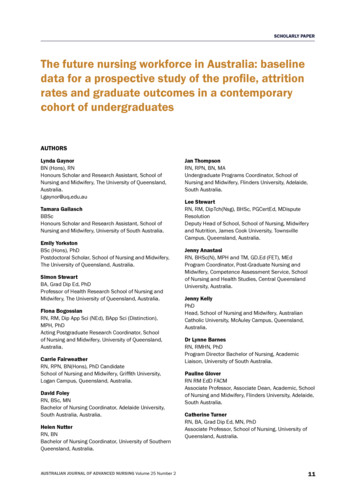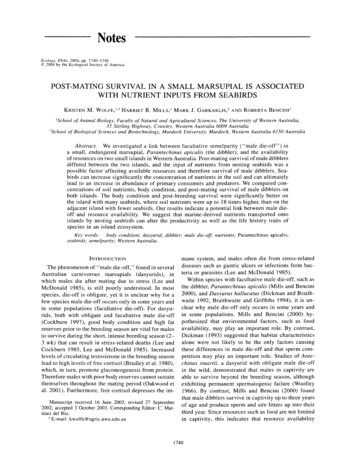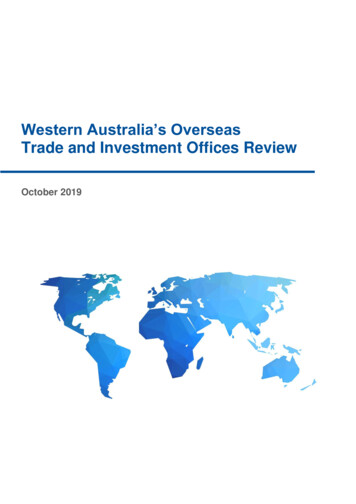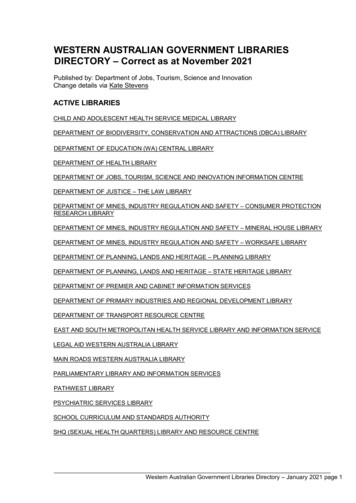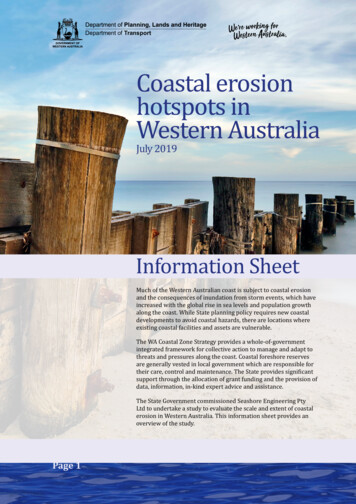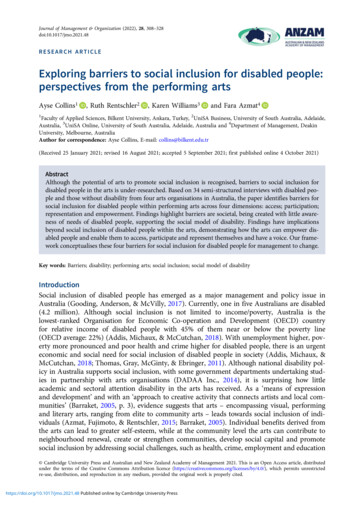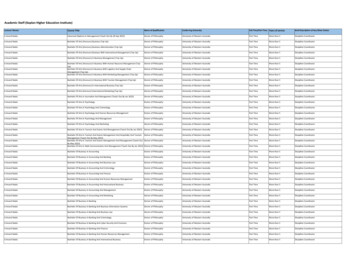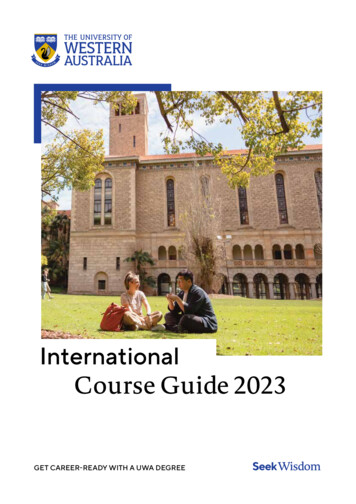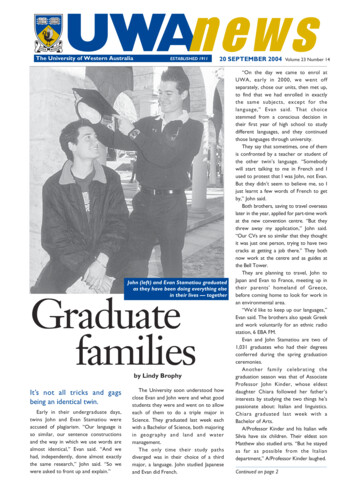
Transcription
UWAnewsThe University of Western AustraliaESTABLISHED 191120 SEPTEMBER 2004John (left) and Evan Stamatiou graduatedas they have been doing everything elsein their lives — togetherGraduatefamiliesby Lindy BrophyIt’s not all tricks and gagsbeing an identical twin.Early in their undergraduate days,twins John and Evan Stamatiou wereaccused of plagiarism. “Our language isso similar, our sentence constructionsand the way in which we use words arealmost identical,” Evan said. “And wehad, independently, done almost exactlythe same research,” John said. “So wewere asked to front up and explain.”The University soon understood howclose Evan and John were and what goodstudents they were and went on to alloweach of them to do a triple major inScience. They graduated last week eachwith a Bachelor of Science, both majoringin geography and land and watermanagement.The only time their study pathsdiverged was in their choice of a thirdmajor, a language. John studied Japaneseand Evan did French.Volume 23 Number 14“On the day we came to enrol atUWA, early in 2000, we went offseparately, chose our units, then met up,to find that we had enrolled in exactlythe same subjects, except for thelanguage,” Evan said. That choicestemmed from a conscious decision intheir first year of high school to studydifferent languages, and they continuedthose languages through university.They say that sometimes, one of themis confronted by a teacher or student ofthe other twin’s language. “Somebodywill start talking to me in French and Iused to protest that I was John, not Evan.But they didn’t seem to believe me, so Ijust learnt a few words of French to getby,” John said.Both brothers, saving to travel overseaslater in the year, applied for part-time workat the new convention centre. “But theythrew away my application,” John said.“Our CVs are so similar that they thoughtit was just one person, trying to have twocracks at getting a job there.” They bothnow work at the centre and as guides atthe Bell Tower.They are planning to travel, John toJapan and Evan to France, meeting up intheir parents’ homeland of Greece,before coming home to look for work inan environmental area.“We’d like to keep up our languages,”Evan said. The brothers also speak Greekand work voluntarily for an ethnic radiostation, 6 EBA FM.Evan and John Stamatiou are two of1,031 graduates who had their degreesconferred during the spring graduationceremonies.Another family celebrating thegraduation season was that of AssociateProfessor John Kinder, whose eldestdaughter Chiara followed her father’sinterests by studying the two things he’spassionate about: Italian and linguistics.Chiara graduated last week with aBachelor of Arts.A/Professor Kinder and his Italian wifeSilvia have six children. Their eldest sonMatthew also studied arts. “But he stayedas far as possible from the Italiandepartment,” A/Professor Kinder laughed.Continued on page 2
UWAnews2Continued from page 1A family affair in Associate Professor John Kinder’s office: with two ofhis three daughters, Chiara and Emilia (on his knee)Although the family speaks English at home, Chiara said shegrew to love the Italian language during frequent visits to hermother’s homeland for Christmas celebrations, family weddingsand her father’s year-long sabbatical, when she spent a year atschool in Italy, at the age of 10.Last year Chiara enjoyed a faculty exchange and spent firstsemester in Bologna, immersing herself in the language. Shethen travelled Europe for six months before returning tocomplete her final semester this year at UWA.Chiara said it was never a problem having her father as ateacher. “He’s such a good teacher and he’s so well-loved by allthe students – it was fine,” she said.Although her studies have taken her on a similar path to herfather’s, Chiara has plans to take a different direction now. “I’mthinking about a post-graduate degree in speech therapy, butthat’s just one option. I’ve done some work with children withspeech problems and I would like to become involved in thetherapeutic side of linguistics,” she said.Along with Chiara, a total of 106 students graduated with aBachelor of Arts. While it’s fashionable for students in otherfaculties to sneer at the job prospects for arts graduates, thereturn to UWA of a distinguished arts graduate should haveproved them wrong.Richard Campbell Smith AO was made an honorary Doctorof Letters at last week’s graduation ceremonies, in recognitionof the great credit he has brought to his university.Mr Smith was one of five consecutive Australian ambassadorsto China who started their diplomatic careers with a Bachelorof Arts from UWA.Mr Smith’s career took him to New Delhi, Tel Aviv, Manilaand Honolulu before serving as Ambassador to The People’sRepublic of China, then the Republic of Indonesia.Despite an international career of more than 30 years, hestill considers himself a West Australian first and foremost, anda proud graduate of UWA.An honorary degree of Doctor of Science was bestowed onProfessor Michael Arbib, a professor of five different disciplinesat the University of Southern California and the Director of thatuniversity’s Brain Project.Professor Arbib has close links with UWA and has been amember of the Board of the Institute of Advanced Studies sinceits inception. He has been heavily involved in research on visionand language in the School of Computer Science and SoftwareEngineering.Another honorary degree of Doctor of Science went toProfessor David Clarkson, an eminent scientist with anacclaimed international reputation in the field of plant mineralnutrition.He holds senior positions at three UK universities anddescribes himself as a life-long experimentalist. His work has ledto the development of new crop cultivars to help feed thegrowing world population.UWA also prides itself on its reputation in plant mineralnutrition and has been honoured to have Professor Clarkson’ssupport over many years.UWAnewsEDITOR/WRITER Lindy BrophyTel.: 6488 2436 Fax: 6488 1192 Email: lindy.brophy@uwa.edu.auEDITOR-IN-CHIEF Colin Campbell-FraserTel: 6488 2889 Fax: 6488 1020 Email: ccampbell@admin.uwa.edu.auDesigned and typeset by Publications Unit, UWAPrinted by UniPrint, UWAUWAnews online: www.publishing.uwa.edu.au/uwanews/Professor Michael Arbib with Professor Robyn Owens working on asign language program in 2003THE UNIVERSITY OF WESTERN AUSTRALIA 20 SEPTEMBER 2004
UWAnews3Old remedycould be new cureFeverfew, a herb used forcenturies by natural healers,has been identified as thebasis for a potentialtreatment for osteoarthritis.Kirk Yip, a PhD student working inOrthopaedic Surgery with Dr Jiake Xu(both pictured above), has found that oneof the active ingredients of feverfew,Parthenolide, has successfully inhibitedthe key pathways to osteoclastformation in mice.Osteoclasts are bone-resorbing cellsthat are responsible for thedevelopment of osteoporosis andcancer-induced bone destruction.Kirk’s work in the MolecularOrthopaedic Laboratory has won himthe Roger Mellick Award for the bestyoung investigator of 2004, from theAustralia and New Zealand Bone andMineral Research Society.He presented his research incompetition with students from otherGo8 universities and the UniversityAuckland. It is the second time in fouryears that the award has gone toOrthopaedic Surgery at UWA. Kirk’sco-supervisor, Professor Ming HaoZheng, said Kirk had been offeredseveral post-doctoral positions in theUS and around Australia as a result ofhis presentations at the Society’sconference.Kirk explained that he had usedlaboratory mice to test Parthenolide onbacteria-induced bone disease.“Effective treatment for bacteriainduced bone disease is not yetavailable. In this study, we showed thatPAR, an inhibitor found in medicinalherbs, can block osteolysis. PAR doesthis by inhibiting osteoclastogenesis andpromoting apoptosis (programmed celldeath) of osteoclasts,” he said.“We can’t say yet how we could usethe results in humans, but I would liketo stay in this lab for a while and keepworking on it, after I’ve finished myPhD.”His work has been accepted forpublication in the Journal of Bone andMineral Research.Kirk completed his first degree, inbiochemistry, at the University of BritishColumbia in Canada. “Jiake (hissupervisor, Dr Jiake Xu) is my uncle’s oldhigh school mate. I had last seen him whenI was about four or five years old. But Iknew that he was doing good molecularbiology — the field that I was interested in— so I came to UWA to do a Masters,which turned into a PhD,” he said.Kirk said he had wanted to find amethod for treating osteoporosis andother bone diseases and he and Dr Xuhad decided to look at herbal extracts tosee if they could help to modulate thefunction of the cells and the cellularpathway.Feverfew (pictured in bloom below) hashad a reputation for decades for beingeffective as a treatment for migraine.Now it has shown potential for treatingosteoarthritis.THE UNIVERSITY OF WESTERN AUSTRALIA 20 SEPTEMBER 2004
UWAnews4New clubmanagerGraduationsreflect ouracademicstrengthcolumnVice-Chancellor’sOur spring graduation ceremonies in Winthrop Hallprovide a sense of well-being about our University – asignificant reminder of the academic strength of ourUniversity.Yet we must never take for granted our levels of performance; nor the wayin which our students, their families and the wider community value theUniversity.Our graduates have been the driving-force behind the social and economicprosperity of Western Australia over almost a century. They have helpedbuild the innovation base, the communications networks and the communityfabric for our modern nation; and are responding to challenges andopportunities in a variety of local, regional, national and internationalenvironmentsThe newly appointed GeneralManager of The UniversityClub of Western Australia,Ken O’Driscoll, will bring aswagofinternationalexperience to the job.Ken (pictured) — who will beresponsible for the existing operationsof University House in the transition toThe University Club which is underconstruction – has 15 years ofmanagement and hospitality experience,including management positions inworld-class facilities in China and HongKong, Singapore, and Indonesia.He’s also no stranger to a universityenvironment, holding a Bachelor of Arts(Recreation) and a Master of BusinessAdministration (MBA). He is also aFellow of the Australian Institute ofManagement.In times of great change, our graduates provide the bedrock on whichuniversity relationships are built, providing strength, reliability and certainty.And, rightfully, our graduates play an integral role in the life and work of ouruniversity – particularly because of the insight they give us into our changingsociety; new working environments and new industries; and the importanceof innovation.They inform our response to change with the understanding of theimportance of producing outcomes that benefit our graduates and the widecommunity – and always at international standards of excellence.The importance of the international focus of our activities cannot beoverstated. Increasingly our graduates have to be able to engage in globaldialogues and cross-cultural exchanges at all levels, across all fields ofendeavour.The benefit of such an international education goes beyond directeconomic considerations. It encourages the establishment of personalfriendships and cross-cultural experiences which support internationallinkages and alliances for the benefit of society.Without perhaps realising it, our graduates give powerful encouragementto their University in remaining true to its fundamental mission of generatingand disseminating knowledge, pursuing truth and seeking wisdom.The ultimate test of how well we do that will be our graduates - for in theirlives, they will shape and lead the communities in which they work and live.Alan RobsonVice-ChancellorKen’s impressive resume is backed bya basic common-sense approach. “Asmile costs nothing,” says Ken, “and ifservice to members comes from theheart then it will always be appreciated.Getting the basics right is essential.Gimmicks and new services are all verywell, but you can only shine when all thefundamental aspects are working well.”The University’s Executive Director,Finance and Resources, Gaye McMath, saidKen would bring to the position a mixtureof fresh ideas and proven practices. .Ms McMath also expressed theUniversity’s appreciation for the work ofout-going manager Jeremey Murray whohas overseen University House operationsfor the past two-and-half years.THE UNIVERSITY OF WESTERN AUSTRALIA 20 SEPTEMBER 2004
UWAnews5FAbulOusadmin staffEver y efficient piece ofmachinery needs a lubricantto keep the cogs turningsmoothly.At UWA, the Faculty AdministrativeOfficers (FAOs) are the oil in the hugemachine that ensures the efficientrunning of student administration andday to day business within the faculties.They are the vital link in the faculties,between academics and administration,between students and academics, andbetween students and administration.The 16 FAOs (some faculties havemore than one) have recently launchedtheir own website to raise their profilewithin the University and to facilitatetheir involvement at the strategic levelwhen changes are being considered.The FAOs used to be part of theRegistrar’s office and reported to theUniversity Secretariat. At the time ofdevolution, the FAOs becameindependent within their faculties,reporting to their individual deans.Jenny Gamble, an FAO at the time ofdevolution, said the group wasconcerned that consistency of bestpractice would be lost if they all wenttheir own ways. “So we formed theFAO group, and that group still meetsregularly with the UniversitySecretariat,” she said.The FAOs perform a myriad of tasks.Their responsibilities include writing andrevision of Faculty rules forundergraduate and postgraduatecourses, including the development ofnew and combined degrees bothonshore and offshore; policy andplanning including strategic andoperational initiatives at the Faculty andUniversity level; committee-relatedduties; all aspects of studentadministration including the provision ofspecialist advice to prospectiveundergraduate and postgraduatestudents on courses appropriate totheir qualifications, and to enrolledstudents on course planning/enrolmentqueries and problems; marketing andsupervision.The complexity of the work in afaculty office means that the teamworkis essential with the Sub-Dean/AcademicStudent Adviser and FAO working veryclosely together. The heavy workloadsand complexity of the businessprocesses also make it difficult to findleave relief.The implementation of the newThe FAOs enjoyed morning tea at the ViceChancellery at the launch of their websiteCallista student administration system,should eventually streamline some ofthe FAO’s work and give them somespace to concentrate more on policydevelopments and strategic planning.The Vice-Chancellor, Professor AlanRobson, hosted a morning tea for thegroup when he launched their newwebsite. The Chair of the FAO group,Maz Schneider, thanked ProfessorRobson, Professor Margaret Seares andthe University Secretariat, for theirsupport of the group.“The FAOs play an integral role inthe academic process of thisUniversity,” Mrs Schneider said. “Wehope that our website will raise ourprofile and that others in the Universitycommunity will find it a useful tool todevelop a keen sense of just what ourrole means.”Director of the UniversitySecretariat, Jackie Massey, congratulatedthe group on the launch of theirwebsite. “The Secretariat really valueshaving a strong and positive relationshipwith the FAOs, as this enables all of usto do our jobs better as we worktogether as a team,” she said.The FAO’s website is at:www.fao.uwa.edu.auTHE UNIVERSITY OF WESTERN AUSTRALIA 20 SEPTEMBER 2004
UWAnews6FastFellows time now to reflect and publishThe University is rewarding PhD candidates who submit their theses in lessthan three years. They are encouraged to apply for a six-month fellowship,which gives them time to write up their research for publication, while waitingfor their results.The scheme could be called the Busy Person’s Fellowship because the firstrecipients have all managed to fit in an extraordinary amount of work in ashort time, one of them completing a part-time PhD (for which six years areallocated) in just two and-a-half years — less than the average full-timegraduate student.They are, in fact, Whitfeld Fellowships, named after UWA’s first ViceChancellor, Hubert Edwin Whitfeld.The University is granted a specific number of places for PhDstudents and that figure is tied in to the number of completions oftheses. So, the more PhDs completed, the more governmentfunding there is for the next intake of students.The Whitfeld Fellowship scheme ( 10,000 for up to six months) is a bonus forboth the PhD candidate and the University.The first seven recipients’ research covers education, human movement,agriculture and resource economics, history, resource engineering andmedicine.Dylan Edwards submitted his thesis inrecord-breaking timeDylan Edwards submitted his thesisafter two-and-half years of mostly parttime study, while holding a full-timeacademic position at another university.But a huge workload is the norm forthis young research scientist, working inthe Brain Research Laboratory in theCentre for Neurological andNeuromuscular Disorders (CNND).A few years before he began workon his PhD, he was working on hisHonours project at the CNND,teaching in the school of biomedicalscience at Edith Cowan University,writing a new unit in motor control forECU, studying physiotherapy, andworking as a physiotherapy assistant atQEII.He is now using his Fellowship tosubmit six research papers forpublication. His research investigateshow we use sensory information tocontrol movement, and may be usefulfor people following stroke, wheremovement skills are re-learned.He attributes his very early thesissubmission to the supportive andprofessional research team in the BrainResearch lab, including his principalCara Weisbrod chose a PhD at UWA overmedical studies in the USsupervisors, Associate Professor GaryThickbroom and Professor FrankMastaglia and the post-graduate coordinator Dr Michelle Burns.“The secret is also to choose anappropriate and realistic topic, and beself-motivated and set yourselfdeadlines,” Dylan said.“I love working in this lab and I hopeI can continue here. The people arefantastic and their work in foundationmapping for the brain is recognised andhighly-regarded around the world,” hesaid.Cara Weisbrod was the firstFulbright Fellow from the US to chooseUWA. She was an undergraduatestudent at the Mayo Clinic five years agowhen she met Human Movement andExercise Science’s Dr Danny Green.Cara came to UWA to do a Masterswith Dr Green — choosing this pathover studying medicine in the US.Her Masters degree quickly became aPhD and she stretched out her 18months Fulbright funding over threeyears. Cara has completed three majorstudies in the reflex control of theTHE UNIVERSITY OF WESTERN AUSTRALIA 20 SEPTEMBER 2004
UWAnewsvasculature in healthy humans, Type 2diabetic subjects, and cardiac transplantrecipients (or how blood vessels reactto different environments).Since submitting her thesis in June,she has, with the help of the Whitfeld,presented her work at the CardiacSociety of Australia and New Zealand inBrisbane, and is presenting her hearttransplant study to the American HeartAssociation meeting in New Orleans inNovember.Cara has had her study on diabetespublished in Diabetes, the highest impactfactor publication in endocrinology inthe world.Some of her findings include impairedvascular and ventilatory responses inpeople with Type 2 diabetes in a hypoxic(low oxygen) environment, such as highaltitude.She also looked at pressure-sensitivereceptors in the human heart thatcontribute to the control of bloodpressure. At Royal Perth Hospital,where Dr Green and his team are based,two different heart transplant techniquesare practised: one removes the pressurecontrolling receptors, the other doesn’t.Although Dr Green was Cara’ssupervisor, Professor Leonard Arnolda,from Medicine and Pharmacology,supported her research into hearttransplant patients.While Dylan and Cara are both keen tostay working in the areas which havesupported their studies, anotherWhitfeld Fellow, Ian Duckham, sayshe wants to reinvent himself.Ian originally trained as an engineerand has spent most of his working lifewith WaterCorp. But he began to beinterested in history in his 30s.“I was in the United States for a whileand studied for a Master of Divinity,which included some historical work.Later, back home, I joined the Artshonours course at UWA and, in theprocess of completing a GraduateDiploma of Arts, I somehow started aPhD,” Ian said.“As a kid, I’d always wanted to be adetective and the historical research I’vebeen doing is very similar.” Ian’s thesiswas on Western Desert missions inWA. He is completing some papersfrom his research and, once his thesis ismarked, he hopes to reinvent theengineer as a historian and is thinkingabout writing a book about religiousmissions in WA.“Having a background in projectmanagement helped me to organise myselfto get my PhD done inside the six yearsfor a part-time student. I bought asoftware package that helped me to planahead, to divide tasks into hours and daysand keep track of where I was.“I also started writing early, instead ofleaving it to the end, like most people. Itmeans a lot of reviewing and rearrangingparts, but it was worth it,” he said.He was still working part-time withWaterCorp while doing his research andhad to take a year off from his studies toreturn to work full-time. He finally tooka voluntary redundancy in 2002 whichhelped him to complete his PhD.“There were some dark days alongthe way, but my supervisor, ProfessorJohn Tonkin, was very supportive,” hesaid.7Wayne McGowan now has time to relax— in Whitfeld Court“I collected all the Hansard reportsrelating to education in WA, and I feltchallenged to find my way through themand do something with all thisinformation,” Wayne said.Wayne McGowan is another partHis project utilised Foucault’stime candidate who completed his PhDthinkingabout the practice ofin less than six years. He has been ingovernment to analyse how the parenteducation all his life, as a teacher,is made responsible for educating theadministrator, project consultant andchild in the name of freedom.director of operations.He was encouraged by hisHis thesis, Thinking About thesupervisors, Dr Felicity Haynes andResponsible Parent: Freedom and EducatingProfessor Keith Punch, and, during histhe Child in Western Australia was aWhitfeld Fellowship, he is rewritingnatural extension for him of a review ofsome parts of his thesis, submittingthe Education Act on which he workedarticles to journals and has signed afor three years until 2000.contract with Edwin MellenPress to publish his thesis.TheotherthreeWhitfeld Fellows are TrudyHoad, who completed aPhD in the schools ofAgricultural and ResourceEconomics and Social andCultural Studies; JamesDoherty, who is stillworking with the Centrefor Offshore Foundations,in Civil and ResourceEngineering; and GiovanniConcu, who also did hisresearch in Agricultural andResource Economics and isin the process of applyingfor post-doctoral positions.The Office of GraduateStudies intends to continueoffering Whitfeld Fellowships to early finishing PhDcandidates.Ian Duckham admires the bust of Hubert Edwin WhitfeldTHE UNIVERSITY OF WESTERN AUSTRALIA 20 SEPTEMBER 2004
8UWAnewsFrom the Academic Board and SenateThis report gives some more background to the decisionmade last month on full fee paying studentsThe Academic Board meeting of August 11and the Senate meeting of August 23considered the introduction of full feeundergraduate domestic student places atUWAThe discussion was brought about by the FederalGovernment’s allocation of a mere 355 new HECS places toUWA, in response to the University’s bid for 750 places.The University already has an over-enrolment greater than355 and the Government’s allocation means a continuingincrease in UWA’s already high entry scores for HECSstudents.The University’s longstanding policy of requiringinternational students to meet the same entry score asdomestic students means a restriction on internationalenrolments as well. The entry scores are not a measure ofthe intellectual skill required to undertake a course but afunction of (Government-controlled) supply and demand.Under the changes introduced by the Federal Governmentat the end of 2003, full fee undergraduate domestic studentsare eligible for a loan up to a maximum figure (currently 50,000) and repayable, like HECS loans, only when anincome threshold is reached, with payments increasing asincome increases.In the past the University has been against full fee placesfor domestic undergraduates because they work against theprinciple of equity of access. However, the creation of aloans scheme repayable like HECS means that this objectionis largely removed for students studying courses whose costfalls within the maximum loan. These students would haveto pay back more than HECS students, by an amount thatvaries according to the course studied.The possibilities for the University were: to maintain itscurrent policy, not admitting full fee paying domesticundergraduate students; to admit such students into courseswhose cost is within the loan limit; or to admit suchstudents into any course.The arguments are complex and because of limited spacethe context outlined above does not include all the relevantdetails. Minutes of the extensive debates which took placecan be read at s for Academic Board and http://committees.uwa.edu.au/senate/senate/minutes for Senate.At Academic Board a motion recommending to Senaterejection of full fee undergraduate domestic places waspassed by 40 votes to 38, with five abstentions. (SomeBoard members had to leave the meeting before the votewas taken.)At Senate three motions were passed, to the followingeffects, with the voting numbers shown:The University will admit students to fee-paying placesin all courses with a total cost below the maximum FEEHELP loan; fees will be set at an amount equal to the sumof the Commonwealth Government contribution andstudent contribution; and the minimum TER score foradmission to the University will be 80. (13-7)The University will offer an additional 100 SWANSscholarships, and will explore the financial and otherimplications of offering four times as many HECS placesas are currently offered under the UWA ExcellenceAwards scheme to students at every secondary school inWA to undertake a course of their choice at UWA,provided that the minimum TER for entry to theUniversity has been achieved. (Unanimous)In principle, students admitted on a fee-paying basiswill be permitted to apply for later admission to a HECSplace with the decision on such transfers being made onthe basis of academic performance. Students must havecompleted at least 48 points of their course betweeneach such application. (12-3, with 3 abstentions)It is interesting that both those in favour ofintroducing full fee undergraduate places for courseswithin the maximum loan and those against argue fromthe need to maintain access and equity of access, and outof consideration for low socio-economic statusprospective students. Everyone agrees that ability tosucceed should be the criterion for entry to UWA.Difference in voting came from the weight given todifferent arguments, including the weight given touncertainties about the future (most notably the possibleelection of a Labor Government pledged to eliminate feepaying domestic undergraduate places). The decision is alandmark in the University’s history, and enhancesUWA’s capacity to manage entry scores for somecourses, to meet the University’s growth targets, and tomaintain an internationally recognised, comprehensiveuniversity.David Griffiths Acting ChancellorDennis Haskell Chair of Academic BoardTHE UNIVERSITY OF WESTERN AUSTRALIA 20 SEPTEMBER 2004
UWAnewsPortfolio foracademicsA new document, known asthe Academic Portfolio, shouldmake some things easier foracademic staff at UWA.In 2002 the University discussed waysto simplify the preparation of materialrequired from academic staff wishing toapply for promotion. It was agreed that,as far as possible, the samedocumentation should be required forpromotion purposes and when applyingfor tenure, or study leave, and any futureperformance management process.It was agreed that the Universityshould introduce the AcademicPortfolio as the key document thatcould be used in all these circumstances.Guidelines were prepared, and9consultation undertaken with theNational Tertiary Education Union, thePromotion and Tenure Committee, andthe Senior Management Group.The Academic Portfolio is a summaryof each academic’s major activities andaccomplishments. Key elements includea Summary Statement, a CurriculumVitae, a Teaching and Learning Folio, aResearch, Scholarship and OriginalAchievement Folio and a Service Folio.As of 2005, academic staff applying forpromotion or tenure will be required toprepare an Academic Portfolio. UWA’spolicy on promotion and tenure has notchanged, nor are academic staff beingasked to provide different content in theirapplications. Rather, they are being askedto provide it in a particular form — onewhich we hope will make the job lessonerous. The current promotion andtenure process will remain viable for 2004.The Academic Portfolio will not berequired for applications for study leave,and for performance review processesuntil 2006, although staff areencouraged to develop one and to use iton all these occasions as soon as it suitsthem.The documentation that will beprovided to assist academic staff inpreparing their Portfolio consists of: Guide for Academic Staff
2 UWAnews THE UNIVERSITY OF WESTERN AUSTRALIA 20 SEPTEMBER 2004 EDITOR/WRITER Lindy Brophy Tel.: 6488 2436 Fax: 6488 1192 Email: lindy.brophy@uwa.edu.au EDITOR-IN-CHIEF Colin Campbell-Fraser Tel: 6488 2889 Fax: 6488 1020 Email: ccampbell@admin.uwa.edu.au
